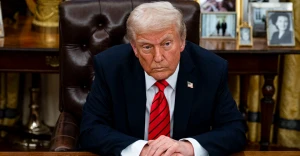
Polish farmers aren't protesting on border with Ukraine, but situation may change - politician
Politician Bogdan Borusewicz says that the previous Polish government failed to address grain-related issues, so the situation needs to be monitored and responded to in a timely manner
He expressed this opinion in an interview with Antin Borkovskyi, host of the Studio West program.
"Regarding negotiations related to grain issues. For example, when Poland was negotiating its accession to the EU, it secured a long period during which there was a ban on the sale of land to foreigners, in case someone was afraid of this. We have to take this into account, because we also have to take into account the interests of our citizens, and farmers are our citizens. And there will be a discussion that should take into account the interests of both sides. And it is quite possible that a transition period will be needed. In the EU, there was a ban on the movement of Polish labor, i.e. workers from Poland. It worked, and those fears disappeared in a couple of years," the Polish politician commented.
According to him, there are no protests of Polish farmers at the border now. If we keep an eye on it and negotiate in time, they will not return. There are no blockades at the moment.
"And there is no grain in Poland today, there is a shortage. We are waiting for the new harvest and then we will have grain, because now we have no grain. We have exported 14 million tons. I recently spoke with a colleague who specializes in this, and he said that Poland has no grain, it is lacking now. When I asked if we would buy grain from Ukraine, he said that there was no grain there either, because Ukraine also exported 24 million tons. Fortunately, there will be a harvest in the near future. But it's time to realize that if there is a problem, it needs to be solved, not waited for months," the senator emphasized.
In his opinion, the previous government did not address this problem, so it only grew.
"The price of grain went down, and farmers claimed and complained that it was due to the influx of Ukrainian grain. And it was because the price of grain had also fallen on world markets. And the government told farmers not to sell this grain now because it would be more expensive in the fall. Meanwhile, in the fall, the price of grain went down, so it was easy to explain, to develop a theory that it was because of Ukrainian grain or Russian grain. So, at this moment, the situation is zero, but we should prepare for possible actions," summarized Bogdan Borusewicz.
What is known about Poles' protests on the border with Ukraine
On February 9, Polish farmers resumed the blockade of checkpoints with Ukraine.
The reason for the renewed protests is simple: according to one of the organizers, Roman Kondruv, it is because the government has done nothing to address the problems of technical grain from Ukraine since the previous protests.
On February 12, at the Ukrainian-Polish border near the Yahodyn-Dorohusk checkpoint, Poles poured grain from Ukrainian trucks onto the ground.
On February 20, Polish farmers on the border with Ukraine blocked the railroad and poured grain out of a freight car. Later it turned out that it was headed to Germany.
In the evening of February 20, Polish protesters eased traffic restrictions near the border with Ukraine at two checkpoints, including Hrebenne-Rava Ruska, and began letting cars through.
Poland's Consul General in Lviv condemned the border blockade and apologized to Ukraine, while Prime Minister Denys Shmyhal later said that Ukraine and Poland were "ready for reasonable compromises' 'in negotiations on the situation at the border.
On February 25, Ukrainian Prime Minister Denys Shmyhal said that Poland had already brought the first offenders on the Ukrainian-Polish border to justice, and they face imprisonment.
In total, Ukraine lost about UAH 8 billion in customs payments, and businesses lost more than €1.5 billion due to the blockade of the border by Polish protesters.
On April 16, Polish farmers stopped blocking truck traffic in front of the Dolhobychuv-Uhryniv checkpoint, but on May 10 they re-established the blockade.
- News











































